#adam zamoyski
Text
Descriptions of Napoleon’s personality by Adam Zamoyski
“He was kind by nature, quick to assist and reward. He found comfortable jobs and granted generous pensions to former colleagues, teachers, and servants, even to a guard who had shown sympathy during his incarceration after the fall of Robespierre. He was generous to the son of Marbeuf, promoted his former commander at TouIon Dugommier and looked after his family when he died, did the same for La Poype and du Teil, and even found the useless Carteaux a post with a generous pension. Whenever he encountered hardship or poverty, he disbursed lavishly. He could be sensitive, and there are countless verifiable acts of solicitude and kindness that testify to his genuinely wishing to make people happy.”
“He was most at his ease with children, soldiers, servants, and those close to him, in whom he took a personal interest, asking them about their health, their families, and their troubles. He would treat them with a joshing familiarity, teasing them, calling them scoundrels or nincompoops; whenever he saw his physician, Dr. Jean-Nicolas Corvisart, he would ask him how many people he had killed that day.”
“He possessed considerable charm and only needed to smile for people to melt. He could be a delightful companion when he adopted an attitude of bonhomie. He was a good raconteur, and people loved listening to him speak on some subject that interested him, or tell his ghost stories, for which he would sometimes blow out the candles. He could grow passionate when discussing literature or, more rarely, his feelings.”

#source:#Napoleon: A Life by Adam Zamoyski#napoleon#Adam zamoyski#zamoyski#napoleonic era#napoleonic#Napoleon biography#bio#napoleon bonaparte#Dugommier#du Teil#La Poype#corvisart#Marbeuf#french revolution#frev#la révolution française#révolution française#first french empire#french empire#France#french history#history#19th century
70 notes
·
View notes
Text

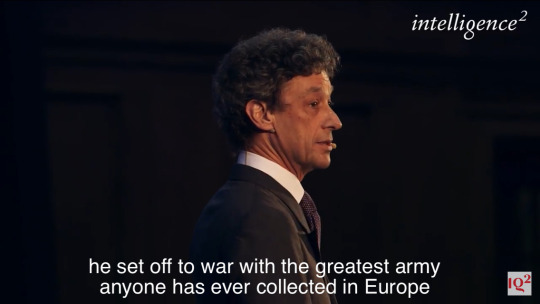
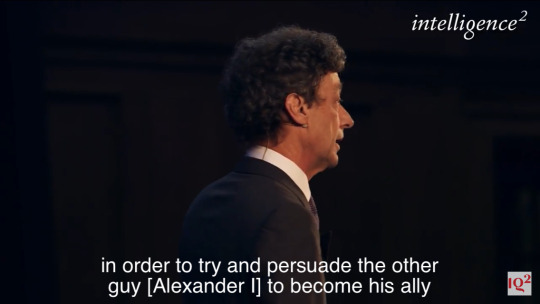
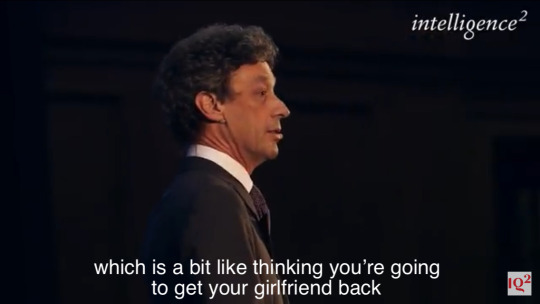

Adam Zamoyski on the Russian campaign in a debate “Napoleon the great?” with Andrew Roberts
#I think about this a lot#napoleon#napoleonic wars#alexander i of russia#tsar alexander I#adam zamoyski#ok i’m sorry for napoleonic posting on main (it will happen again)
65 notes
·
View notes
Text
I will leave it up to you how accurate you think the account of the mistress of Metternich is, but this passage about Alexander’s stay in London is so funny to me. I mean the English at this time were generally curious about foreigners but this is admittedly more intense
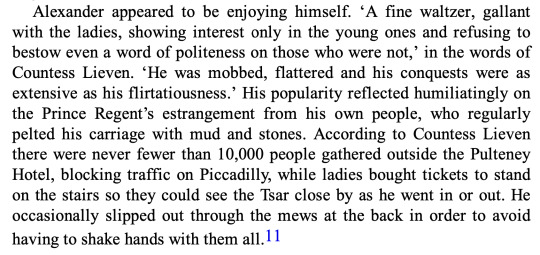
from “Rites of Peace: The Fall of Napoleon and the Congress of Vienna” by Adam Zamoisky
#alex was living that celebity idol life#tsar alexander i#alexander i of russia#dorothea lieven#napoleonic wars#adam zamoyski#just like another certain pole called Adam I would say he is more critical of Alexander in his book than most
25 notes
·
View notes
Text


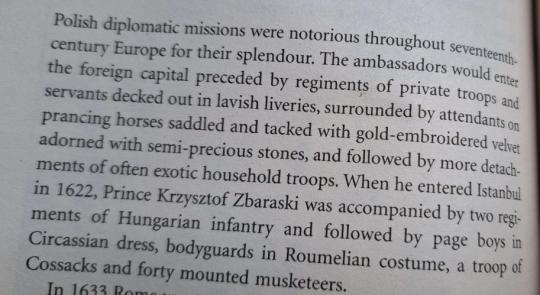
no more book experts i promise but this is so feliks!!!! the dramatics!!! more lavish over the top feliks in historical stuff i need it!!
#source is poland a history by adam zamoyski#also read some other interesting stuff about polands lavishness but im saving that for a fic ooh#maia talks
18 notes
·
View notes
Text
shoutout to the guy who sent king louis-philippe four rattlesnakes in the mail (cit. adam zamoyski, phantom terror). it's a dumbass plot that had literally zero possibility of success and i love it.
782 notes
·
View notes
Text

STOP DOING THIS TO ME WAHHGHFDGHDG

Source - "Moscow 1812: Napoleon's Fatal March" by Adam Zamoyski, page 358 (cool book btw, pirated it)
30 notes
·
View notes
Text


I've been pretty deep in my Napoleonic phase lately and constantly obsessed on learning (discovering?) more about that era, I wanted to make some glossy prints on some of my favs with their official (?) portraits to see how it'll turn out. (ꈍᴗꈍ)♡ I'm actually pretty happy how they turned out and may print more for my own personal photo album.
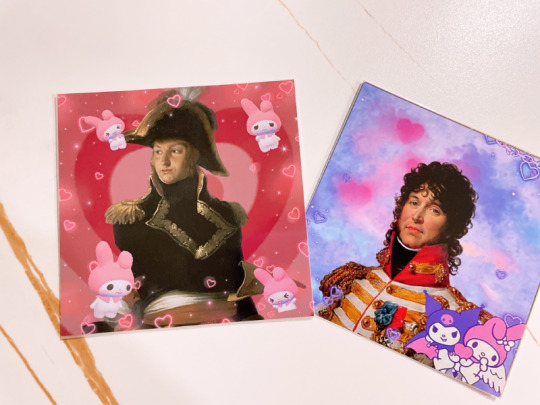
Junot!! because he needs more love.
And Murat because he's my precious bb send help ❤️❤️❤️
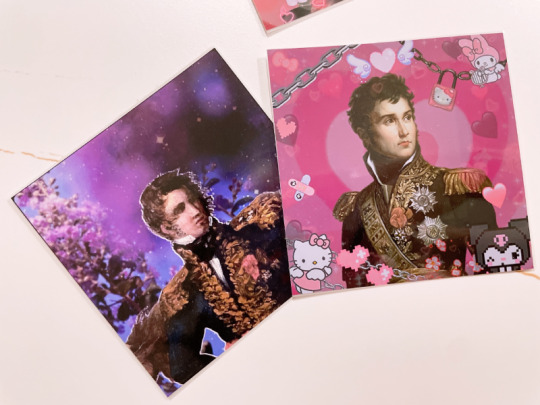
Lannes 💗 Who doesn't love Lannes? so made two for Lannes, you go Jean Lannes!


something I totally didn't need but made bought a Lannes cup because why not. Mostly because I just really love this portrait of him by Julie Volpelière 🥺 currently making a Murat one as I write this
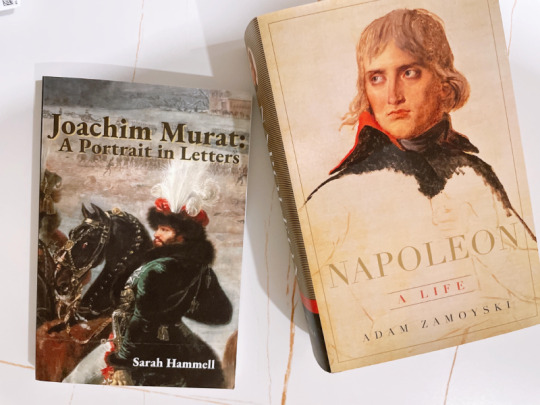
*BONUS* I recently bought these two books off Amazon to my collection!! Joachim Murat: A Portrait in Letters by @joachimnapoleon and Napoleon: A Life by Adam Zamoyski. Now I just got to find time to read since is school starting soon *cries*
#my wallet wasn't too badly damaged so yay#i may have overdone the use of purple and florals /shrug#bless picsart tbh#joachim murat#jean lannes#jean andoche junot#napoleon#napoleonic#personal rambles
35 notes
·
View notes
Text
My former English professor is retiring and gave away a bunch of the books in her office. She's a gem. I giddily returned to campus just to sort through her collection. Super excited about the ones I brought home with me. I thought someone else might appreciate some of the books I found.
I've already began poring over the poetry collections, but what should I read first? Are there any that you guys have read that you highly recommend?
Books included in Photo 1:
● Sense and Sensibility by Jane Austen (Alta Edition includin Persuasion)
● Robert Burns by David Daiches
● Far From the Madding Crowd by Thomas Hardy
● Leigh Hunt's What is Poetry? by Albert S. Cook
● Love Letters Between a Nobleman and His Sister by Aphra Behn
● Virginia Woolf: A Biography by Quentin Bell
● Holy Madness: Romantics, Patriots, and Revolutionaries 1776-1871 by Adam Zamoyski
● Earnest Victorians by Robert A. Rosenbaum
● Lord Byron: Selected Letters and Journals by Lord Byron, Leslie A. Marchand (Editor)
Books Included in Photo 2:
● Orlando by Virginia Woolf
● Brave New World by Aldous Huxley
● The Portable Irish Reader, (The Viking portable library) by Diarmuid Russell
● The Last Days of Pompeii by Edward Bulwer-Lytton
● Becoming a Heroine by Rachel M. Brownstein
● To the Lighthouse Virginia Woolf
● East Lynne by Ellen Wood, writing as Mrs Henry Wood
● Poetry and Prose of Alexander Pope edited by Aubrey Williams
● In Memoriam; An Authoritative Text, Backgrounds and Sources, Criticism (Norton Critical Editions) by Alfred Tennyson
● Daughters and Fathers by Lynda E. Boose, Betty S. Flowers
Books Included in Photo 3:
● Jude the Obscure by Thomas Hardy
● A Sentimental Journey by Laurence Sterne
● Goblin Market and Other Poems by Christina Rossetti (Dover Thrift Editions)
● Sound the Deep Waters: Women's Romantic Poetry in the Victorian Age includes works by Christina Rossetti, Elizabeth Barrett Browning, George Eliot, Alice Meynell, and Edith Nesbit
● The Jane Austen Book Club by Karen Joy Fowler
● The Monsters: Mary Shelley and the Curse of Frankenstein by Thomas Hoobler and Dorothy Hoobler
● Wordsworth and the Poetry of Human Suffering by James H. Averill
● Victorian Ghost Stories: By Eminent Women Writers (Part of the The Virago Book Series) edited by Richard Dalby
● The Blind Assassin by Margaret Atwood
● Victorian Poetry and Poetics by Walter E. Houghton G. Robert


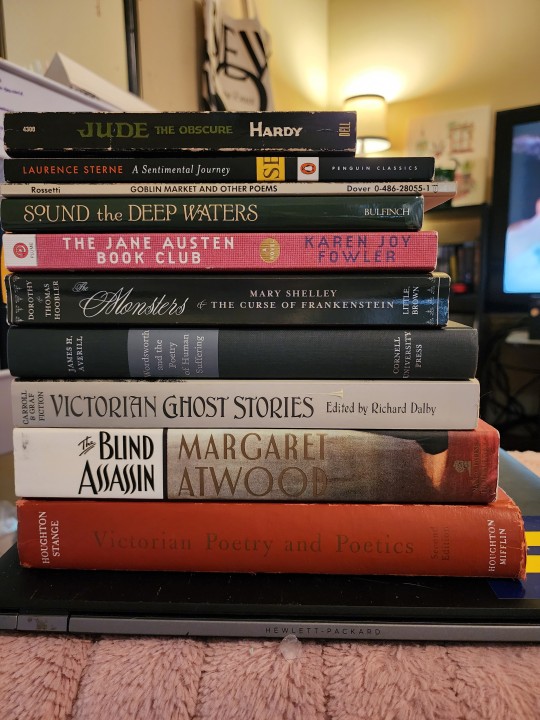
#bookish#bookworm#books#book haul#booklr#book tumblr#books and literature#booklover#booksbooksbooks#books & libraries#bookblr#book blog#women reading#reading#literature#english literature#literary fiction#literary#margaret atwood#jane austen#thomas hardy#virginia woolf
53 notes
·
View notes
Text
[Stanisław August's] refusal to wear Polish dress was dictated principally by vanity, as it normally demanded closely cropped hair, and he was very proud of his long tresses. In order to scotch grumbling, he had taken the precaution of getting six doctors to sign a document to the effect that a sudden haircut would expose him to illness.
The Last King of Poland by Adam Zamoyski, p. 105
Apparently even the king is not immune up the perils of 💀The Draught💀
#stanisław august poniatowski#18th century history#this is hilarious to me#pleading przeciąg#to get out of looking unfashionable
16 notes
·
View notes
Text
Portrait of Napoleon’s older brother, Joseph
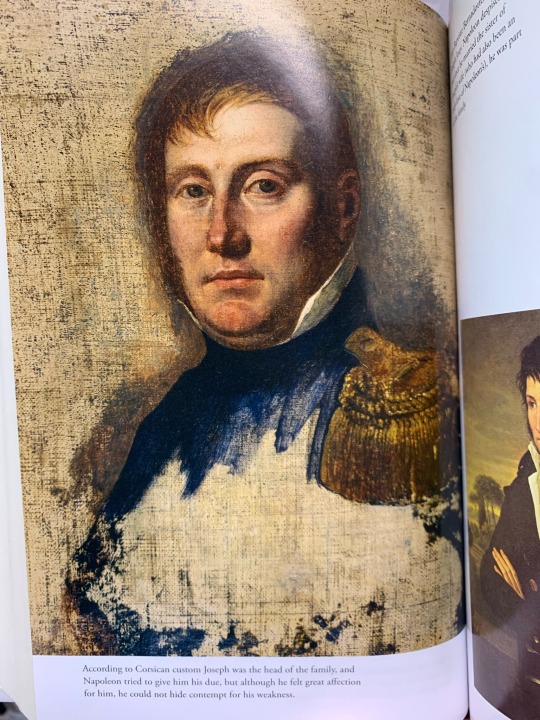
Caption says:
According to Corsican custom Joseph was the head of the family, and Napoleon tried to give him his due, but although he felt great affection for him, he could not hide contempt for his weakness.
Source: Napoleon: A Life, by Adam Zamoyski
#in the corner you can see his other brother Lucien#joseph bonaparte#Adam zamoyski#Napoleon bio#Napoleon biography#book#book pic#portrait#1800s#1800s art#Napoleon’s brothers#Napoleon’s family#napoleonic#napoleonic era#frev#french revolution#19th century#first french empire#french empire#france#history#Corsica#La corse#corse
48 notes
·
View notes
Text
It had been the greatest massacre in recorded history, not to be surpassed until the first day of the Somme in 1916. One does not have to look far to see why. Two huge armies had been massed in a very small area. According to one source, the French artillery fired off 91,000 rounds. According to another they fired only 60,000, while the infantry and cavalry discharged 1,400,000 musket-shots, but even that averages out at a hundred cannon shots and 2300 rounds of musketry per minute.
—Adam Zamoyski on the battle of Borodino, 1812: Napoleon’s Fatal March on Moscow
59 notes
·
View notes
Text
Happy birthday, Marshal Lefebvre!
Here is a short passage from a book about the Russian campaign of 1812. The author writes that Napoleon's troops, as they were retreating from Russia, were terrified by the skirmishes led by the Tsar's cossacks and hussars. Here is what Lefebvre did about it:
"On 2 November Marshal Lefebvre harangues the Old Guard on the subject with his usual directness. 'Grenadiers and Chasseurs, the cossacks are there, there, there and there,' he said, gesturing to the four points of the Compass. 'If you do not follow me you are f___d. I am no ordinary general, and it is with good reason that in the army of the Moselle I was known as the Eternal Father. Grenadiers and Chasseurs, I say to you again: if you do not stay with me you are f___d. And anyway, I don't care a f___k. You can all go and f___k yourselves.' The Guard did not disappoint, and the ranks remained steady throughout; but the same could not be said of other troops."
This is from Adam Zamoyski's "Moscow 1812: Napoleon's Fatal March. London: Harper Collins, 2004, page 383.
I'm not sure the Old Guard took Lefebvre's rough language seriously; he showed a soft touch at least on occasion.
38 notes
·
View notes
Text
Unfortunately my barometer for "there's going to be some extremely dumb shit re: an Eastern European country at the international-relations level & subsequent Anglophone chattering-class punditry level that circulates as op-eds in Papers of Record & Public Talks giving laypeople a crash course on the last 100 years of the place making headlines" is when those countries' internal nationalist talking points break linguistic + discursive-field containment & suddenly everyone's an English-language expert on Adam Zamoyski's hot rzeczpospolita takes or Piłsudski's official hagiography or whatever. Put that thing back where it came from or so help me--
#Roaming around with a rubber mallet and bonking journalists who talk about Ukraine or Poland when they just learned about#Those places that week like it's whack-a-mole#I thought Norman Davies was dead djdjfjf
7 notes
·
View notes
Text
in poland they used to have these huge week-long funerals that were like massive celebrations with fireworks and entertainment and so much money put into them and i just think feliks would LOVEEE attending his own funeral after he died in battle <3
he's having a great time treating it like a party and complaining about how they styled his corpse's hair (while poor liet watches in bemusement and wonders if this is lowkey a little blasphemous)
sources ↓
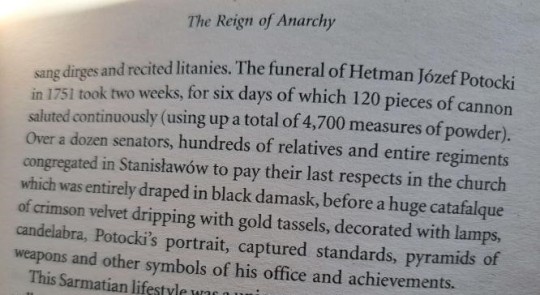
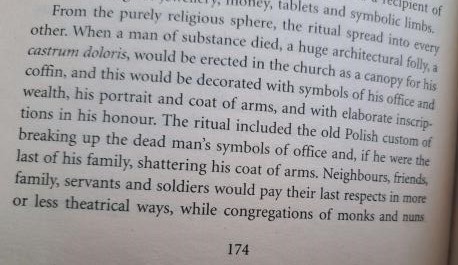

#i was gonna write a fic about this but im not sure now so heres a post abt it !!#hws poland#maia talks#book is 'poland a history' by adam zamoyski
8 notes
·
View notes
Text
Is it bad that the police state in Metternich’s Austria was so strict that the youths would go to coffee shops to meet their friends & not talk for a few hours for fear of being arrested as revolutionaries? (citation: Adam Zamoyski, Phantom Terror) Yes.
Is it hilarious that the hot trend was to go to Starbucks and sit in silence? Also yes.
37 notes
·
View notes
Quote
The Polish cavalry was entirely different in character. It was made up of well trained, mounted and equipped regiments which prided themselves on being elite formations. The numbers were small, no greater than 10,000 fighting men or 'sabres' at the beginning of 1920, as much because of a shortage og good horses as because of the belief widespread following the Great War that cavalry was out of date. But they made up for their small number by their skill, and their handling of the lance gave them an edge over the Red cavalrymen.
Adam Zamoyski, Warsaw 1920
8 notes
·
View notes